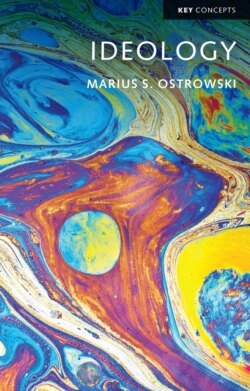Ideology

Реклама. ООО «ЛитРес», ИНН: 7719571260.
Оглавление
Marius S. Ostrowski. Ideology
Table of Contents
List of Tables
List of Illustrations
Guide
Pages
Series Title. Key Concepts Series
Ideology
Copyright Page
Figures and Tables. Figures
Tables
Preface
1Introduction
§1 The central questions in the study of ideology
§2 From the study of ideology to ideology studies
§3 Plan of the book
2The evolution of ideology theory
§1 1800–1890: the classical period of ideology analysis
§2 1890–1945: new concerns and approaches
§3 1945–1980: terminological and methodological challenges
§4 1980 to now: the emergence of ‘ideology studies’
3What is ideology?
§1 Making sense of reality
§2 Criteria of ideological characterisation
§3 What is and is not (an) ideology
4Ideology and ideologies
§1 The preconditions of ideology
§2 The morphological history of ideologies
§3 Ideological categorisation
5The experience of ideology
§1 The formation of ideological subjects
§2 How ideological subjectification works
§3 The limitations of ideology
6The dimensions of ideology studies
§1 The social- and political-theoretical epicentre
§2 The social-scientific and humanistic penumbra
§3 The ‘ideology studies compass’
7Conclusion
References
Index
POLITY END USER LICENSE AGREEMENT
Отрывок из книги
Marius S. Ostrowski
2 An overview of ideologies’ historical development
.....
Aspects of these questions have formed part of the standard material of philosophy and social theory since at least the Renaissance. Epistemology and philosophy of mind, language, science, and religion, and branches of early ethnography and cultural studies have long considered the relationship of abstract ideas to reality as either ‘inner essences’ or mediated representations, whether we can acquire reliable knowledge about the world, whether morality is real or synthetic and absolute or relative, the nature and sources of popular opinions, and so on. But, since around 1800, these questions have been increasingly corralled together under the rubric of addressing a specific social phenomenon. The first to use the term ‘ideology’ for this phenomenon were a group of late Enlightenment philosophers in post-Revolutionary France, who saw in it the promise of a new science of ideas, mental perceptions, and thought processes. But its rise to prominence (and its metonymic shift) came with the Marxist transformation of social thought from post-Hegelian philosophical materialism into the embryonic outlines of sociology, which tied ‘ideology’ explicitly to the cultural manifestations of capitalist, classist society. At the turn of the 1900s, sociology’s crystallisation as a discipline with many parallel traditions (positivist, anti-positivist, conflict-theoretic, functionalist, etc.) introduced new focuses on the collective and individual dynamics of crowd psychology and the role of propaganda and the media, as well as non-classist explanations for ideological support. Meanwhile, the growing prominence of scientific and statistical research methods enabled new approaches to studying ideology via polling, quantitative survey research, and breakdowns of electoral results. By the mid-1900s, the ascendancy of social science pushed the study of ideology heavily towards comparative empirical assessments of voters’ and legislators’ policy preferences and the demographics of pro- and anti-system movements. At the same time, new challenges and modifications to classical social theory (especially the rise of structuralism and poststructuralism) found ‘ideology’ increasingly inflexible and outmoded as an analytic tool, spurring the development of new lexicons to explain the conditions and impulses for human thinking, expression, and other social actions.
For much of this time, the ‘study of ideology’ and the ‘study of ideologies’ operated with considerable mutual autonomy and internal diffuseness. But by the turn of the 1980s, and accelerating prodigiously since the 1990s, a major wave of new appreciations of ideology and ideologies have emerged that seek to unite the study of both in a systematic, holistic way. They do so from a wide range of disciplinary angles: social and political theory, intellectual history, philosophical hermeneutics, sociolinguistics, communication studies, social psychology, and political science. Their shared aim is to elevate ‘ideology’ from an instrumental factor in analysing other social phenomena and a tool in other subfields’ arsenals into a dedicated ‘subject’ and subdiscipline in its own right. Early markers of the emergence of ‘ideology studies’ and its multiple theoretical approaches were laid down by a spate of books that explicitly tackled the concept’s definition and social function and offered the first syncretic overviews of the history and ‘state of play’ of ideology studies. These ranged from conceptual histories of ideology theory by Hans Barth (1977) and Jorge Larraín (1979) to evaluations of its latest developments by David Manning (1980), Howard Williams (1988), and David McLellan (1995), along with a mixture of both by Terry Eagleton (1991); from the critique of ‘thinking in ideology terms’ by Kenneth Minogue (1985) to the defence of ideology analysis as a tool of critique by Raymond Geuss (1981); from refinements of existing traditions by Göran Therborn (1980) and John B. Thompson (1984) to wholly novel accounts by John Plamenatz (1970), Martin Seliger (1976), and Raymond Boudon (1989). At the same time, academic journals were founded that made explicit space for ideological analysis, including Rethinking Marxism (1988–), Constellations (1994–), and Historical Materialism (1997–) in the Marxist tradition, Philosophy and Social Criticism (1973–) and Theory, Culture & Society (1982–) in a more ecumenical vein, and the Journal of Political Ideologies (1996–) as the first dedicated ideology studies journal, alongside the formation of university centres dedicated partly or fully to the study of ideologies, at Essex (1982–), Boston (1988–2010), Cambridge (1994–), Oxford (2002–11), Queen Mary (2007–), Nottingham (2013–), St Andrews (2013–), and Helsinki (2016–).
.....